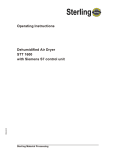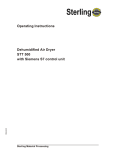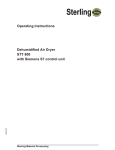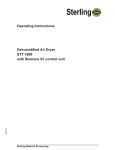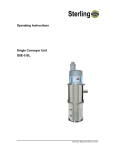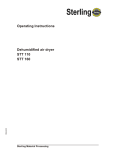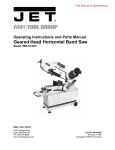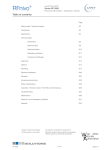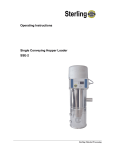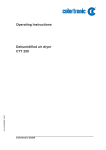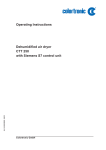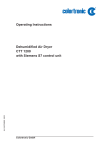Download Sterling SDF 250 Dehumidifier User Manual
Transcript
Operating Instructions Dehumidified air dryer SDF 250 SDF 400 SDF 500 With Touch control unit Sterling Material Processing SDF 250/400/500 Sterling Material Processing 5200 West Clinton Ave. Milwaukee, WI 53223 Telephone: (414) 354-0970 Fax: (414) 354-6421 www.sterlco.com Technical service: Service department Telephone: (800) 423-3183 Edition: 12/03 These operating instructions are for*: (* please fill in personally) Serial number: Year of manufature: Date of Delivery: Number of delivery: Date of commissioning: Location: Group of machines: 2 SDF 250/400/500 Sterling Material Processing retains all rights to change the information in these operating instructions at any time without notice. We assume no liability for any errors or direct or indirect damage resulting in context with these operating instructions. Copying, translation or publication in any form except for personal use of purchaser requires approval from Sterling Material Processing. All rights reserved. 3 SDF 250/400/500 Table of contents 1. General Information .............................................................................................1-1 1.1. Warnings and symbols.......................................................................................1-2 1.2. Explanations and information ............................................................................1-4 1.3. Legal basis ........................................................................................................1-4 1.4. Fields of applications.........................................................................................1-4 1.5. Notes on Usage..................................................................................................1-4 2. Safety instructions ................................................................................................2-1 2.1. General..............................................................................................................2-2 2.1.1. Assembly ..............................................................................................2-3 2.1.2. Operation ..............................................................................................2-3 2.1.3. Maintenance..........................................................................................2-4 2.2. For the safety of the devices ..............................................................................2-5 3. Start up.................................................................................................................3-1 3.1. Control Unit ......................................................................................................3-2 3.1.1. Touch Screen ........................................................................................3-2 3.2. Switching on the Dryer......................................................................................3-3 3.3. Basic parameters................................................................................................3-4 3.3.1. Entering Dryer Values...........................................................................3-4 3.3.2. Entering hopper values..........................................................................3-6 3.3.3. Setting the timer....................................................................................3-8 3.3.4. Observing processing status ................................................................3-10 3.3.5. Setting date and time...........................................................................3-11 3.3.6. Changing language..............................................................................3-12 3.4. Continuous operation.......................................................................................3-14 3.4.1. Continuous Operation of the Hopper ...................................................3-14 Continuous Operation of the Dryer.....................................................................3-14 3.5. Switching the dryer/hopper heater off ..............................................................3-16 4. Error and error correction .....................................................................................4-1 4.1. Actual messages ................................................................................................4-3 4.2. Alarm protocol ..................................................................................................4-7 5. Maintenance.........................................................................................................5-1 5.1. Maintenance schedule........................................................................................5-3 5.2. Cleaning or Replacing the Air Filter ..................................................................5-4 5.2.1. Cleaning or Replacing the Return Air Filter ..........................................5-5 5.2.2. Cleaning or Replacing the Regeneration air filter ..................................5-6 5.2.3. Filter of the electrical cabinet ................................................................5-7 5.3. Disposing of Drying Agents ..............................................................................5-8 5.4. Cleaning the Drying Hopper ..............................................................................5-9 5.5. Changing the battery of the control system ......................................................5-12 5.5.1. Resetting the control values.................................................................5-14 6. Functional description ........................................................................................6-15 6.1. General Information ........................................................................................6-16 6.2. Drying Hopper (Optional)................................................................................6-17 6.2.1. Hopper heaters (optional)....................................................................6-17 4 SDF 250/400/500 6.3. Connection to a Pneumatic Conveying System (Optional) ...............................6-18 6.4. Return Air Cooler (Optional)...........................................................................6-18 7. Transport, Assembly and Storage .........................................................................7-1 7.1. Tansport and Packing ........................................................................................7-2 7.2. Assembly ..........................................................................................................7-4 7.3. Storage ..............................................................................................................7-4 8. Assembly instructions ..........................................................................................8-1 8.1. Installation of the exhauster fan for regeneration of exhaust air..........................8-2 8.2. Connection of Return Air Cooler (Optional) ......................................................8-2 8.3. Electrical Connection ........................................................................................8-3 8.4. Compressed Air Supply.....................................................................................8-4 9. Technical data ......................................................................................................9-1 10. Accessories.....................................................................................................10-1 5 SDF 250/400/500 1. General Information These operating instructions are addressed to all users of the device. These operating instructions must be used by every person charged with work on the unit. General Information 1-1 SDF 250/400/500 1.1. Warnings and symbols The following warnings and symbols are used in these operating instructions: This symbol indicates danger to life! Fatal or serious injury is possible if the corresponding instructions, regulations or warnings are not observed. L F & $ This symbol indicates that serious injury is possible if the corresponding instructions, regulations or warnings are not observed. This symbol indicates that extensive damage to equipment is possible if the corresponding instructions, regulations or warnings are not observed. This symbol indicates information important for becoming familiar with the equipment, i.e. technical correlations. This symbol indicates that a technical term is explained at this point. General Information 1-2 SDF 250/400/500 When disposing of drying agents / batteries / oil, observe all official rules. Caution: High noise pollution ! For all work on the equipment, hearing protection should be worn. Avoids impairment of hearing! Caution: Danger of crushing ! Disconnect the equipment from mains supply before starting mainenance procedures. All compressed air pipes on the equipment should be depressurised before starting maintenance work. Caution: Danger of hot surface ! Before starting any work wait until all parts have been cooled down sufficiently. Avoid touching any of these parts! Caution: Danger of skidding ! Remove any granules remaining on the ground. Caution: Danger to life through electrical shock ! Observe that the control system is still under voltage even when the main switch is switched off. Check the direction of rotation of the blowers after the electrical connections have been made (see rotational direction arrow). General Information 1-3 SDF 250/400/500 1.2. Explanations and information Various terms and designations are used in these operating instructions to ensure clarity. Therefore please note that the terms used in the text stand for the corresponding explanations listed below. • Equipment: ”Equipment” can mean an individual unit, a machine or an installation. • Operating personnel: The ”operating personnel” are persons operating the equipment on their own responsibility or according to instructions. • Operator : The ”operator” of the equipment (production manager, foreman, etc.) is the person responsible for all production sequences. The operator instructs the operating personnel of what is to be done. • Operating instructions: The ”operating instructions” describe the interaction of the equipment, production sequences or methods. The operating instructions must be compiled by the operator of the equipment. • Equipment foreman: When several operating personnel work on one machine, the ”equipment foreman” coordinates the sequences. The equipment foreman must be appointed by the operator. • Trained personnel: ”Trained personnel” are persons who, due to their training, are authorized to carry out the required work. 1.3. Legal basis See “Manufacturer’s Certificate” resp. “Certificate of Conformity”. 1.4. Fields of applications For the drying of thermoplastic granules and regrind before processing in order to remove all remaining moisture from the granules both inside and out, independent of climate or ambient air conditions. 1.5. Notes on Usage • Experienced operators can begin directly with the chapter on “Start-up” if the unit has been properly installed. • If the unit has not been installed yet, observe the instructions in the chapter on “Assembly Instructions” and “Transport, Assembly and Storage”. General Information 1-4 SDF 250/400/500 2. Safety instructions These safety instructions apply to all persons within the range of action of the equipment. Please inform all persons within the range of action of the equipment of the direct and indirect hazards connected with the equipment. These operating instructions are to be used by all persons assigned activities connected with the equipment. Knowledge of the English language is prerequisite. Ensure in each case that the operating personnel are familiar with the operating instructions and the function of the equipment. For your safety Safety instructions 2-1 SDF 250/400/500 2.1. General The operating personnel of this equipment must be at least 16 years old. Please read these operating instructions carefully before taking into operation for the first time. Contact us should questions arise. This avoids injury and damage to equipment! These operating instructions must be kept available at all times at the place of operation of the equipment. Improper operation results in danger of accidents! Please note that, for reasons of clarity, not all conceivable cases regarding operation or maintenance of the equipment can be covered in these operating instructions. Please observe all safety instructions and warnings on the equipment. This avoids injury and damage to equipment! All work on the equipment is to be carried out by persons whose qualifications are specified in the pertaining chapters of the operating instructions. Improper operation results in danger of accidents! The proper working clothes are to be worn during any work on the equipment. This avoids injury! The local regulations and requirements pertaining to this equipment must be observed. Disconnect electrical components from the mains supply before work is carried out on these components Caution: Danger to life through electrical shock! Compile detailed operating instructions based on these Operating instructions for the sequence of procedures to be carried out on this equipment. Improper operation results in danger of accidents! Observe that the control system is still under voltage even when the main switch is switched off. Caution: Danger to life through electrical shock! Safety instructions 2-2 SDF 250/400/500 2.1.1. Assembly Compare the connected loads with those of the mains supply. Danger of injury through electrical shock! When using lifting gear, please observe the pertaining regulations. Caution: Danger of accidents! Do not modify, add other equipment or change the design of the equipment without the approval of the manufacturer. Caution: Danger of accidents! Attachments not supplied by Sterling must be manufactured in accordance with safety regulation EN 294. Danger of accidents! The equipment may only be operated when all the associated components are properly connected up and in accordance with the relevant regulations. This avoids injury and damage to equipment! Operate the device only if all its components are grounded. Danger: accident through electrical shock! Please note for installation that the equipment is top-heavy. Danger exists that it may topple over! Take care that the device is not standing on the mains cable. This will prevent danger to people and material! 2.1.2. Operation Appoint an equipment foreman to be responsible for the equipment. Ensure that the operating personnel are provided detailed instruction in the operation of the equipment. Improper operation results in danger of accidents! When the main switch is switched off for reasons pertaining to safety, it must be secured against unauthorized activation. Caution: Danger of accidents! Repair work may be carried out by trained personnel only. Caution: Danger of accidents! Never operate the equipment when partially dismantled! Danger! Limbs may be caught in machinery! Electric shock! In case of malfunction, shut down the equipment immediately. Have malfunctions corrected immediately. Danger of accidents! The machine is intended only for the drying of granulated plastics. Any other or additional use is contrary to specifications. This equipment is not suitable for food processing. The safety instructions of the connected machines must be followed. Please note that sound levels exceeding 85 db(A) may in the long term damage your health. Use the appropriate ear muffs. This avoids impairment of hearing! Please note that the drying cells, drying hoppers and air pipings grow hot during use. Avoid touching any of these parts! Danger: Injury through burns! Never operate the dryer without side panels. Danger: Limbs may be caught in machinery! Injury through burns! When drying plastics which emit gases dangerous for human health, take care that the regeneration exhaust air is disposed of without polluting the environment. This will prevent danger Safety instructions 2-3 SDF 250/400/500 to people and material! 2.1.3. Maintenance Before starting maintenance work, appoint a supervisor. Inform the responsible personnel before maintenance work on the system is started. Caution: Danger of accidents! Disconnect the equipment from mains supply before starting maintenance procedures to ensure that it cannot be switched on unintentionally. Caution: Danger of accidents! All pipes, hoses and screwed connections should be checked regularly for leaks and damage. Any faults which arise should be corrected immediately. Danger of accidents! Depressurize all compressed air piping before starting maintenance work. Danger of accidents! The air filters should only be cleaned/replaced when the the main switch is off and the blower has stopped. This avoids injury and damage to equipment! Any maintenance work on the equipment should only be started when the the main switch is off and the blower has stopped. This avoids injury and damage to equipment! Check the v-belts of the blower only when the main switch is switched off and the blowers have stopped. Caution: Danger of accidents! Open drying hoppers only if they are completely empty. Danger of accidents! Never open drying hoppers while the device is in operation. Danger: Injury through burns! Open drying hoppers only if they have been cooled down sufficiently. Danger: Injury through burns! Before starting maintenance work wait until the drying cells, drying hoppers and air pipings have been cooled down sufficiently. Avoid touching any of these parts! Danger: Injury through burns! Remove any granules remaining on the ground. Danger of accidents! Arrest the wheels after installation if the dryer is mounted on a movable frame. This will prevent danger to people and material! Safety instructions 2-4 SDF 250/400/500 2.2. For the safety of the devices Never change settings without carefully assessing the consequences. Use only original Sterling spare parts. Observe the maintenance instructions. Keep a record of all maintenance works and repairs. Please note that electronic components can be damaged by static discharge. Before initial operation and in regular intervals, make sure that no electrical connections are loose. Never readjust sensors without exactly knowing their functions. Please ensure that the permitted storage temperature lies between -20 and +55 °C (-4 to +131 °F). Please ensure that the permitted operation temperature lies between 0 and +45 °C (32 to +113 °F). Check the direction of rotation of the blowers after the electrical connections have been made (see rotational direction arrow). Clean the drying hoppers before the first filling. Note the instructions of the material manufacturer for the maximum drying temperature. Note the drying instructions of the material manufacturer. Take care that the drying hoppers are always completely filled and that the retention period is respected if continual removal is taking place. Note that too large amounts taken from the drying hopper lead to insufficient drying of the material. Close the air stop valves of drying hoppers which are empty or have not been used. Note down all data which you have entered into the control system. The password is to be entrusted to authorised personnel only. Please note that the temperature of the dryer heating system must always be set lower than that of the supplementary heaters. When you dispose of drying agents, observe all official rules. Note that drying cells are replaced or refilled by Sterling only if they are empty. The material level may not fall below 40 % in the drying hopper, when material is continuously removed from the drying hopper, but no material is continuously fed into the drying hopper (batch drying). Close the throttle valves. Read the operating manuals of the connected devices. Please note that a compressed air supply is required for the operation of the unit. Never set a higher operating pressure than 6 bar for the hopper loaders (system overpressure). Safety instructions 2-5 SDF 250/400/500 3. Start up This chapter is addressed to the operators of the machine. This chapter assumes general skills with drying systems and SPS (PLC) control units. This chapter assumes that the functional description has been read and understood. It must be ensured that the operators have the relevant skills. F Note down all set values of the control system. Make sure that the cooling appliance is connected to the mains socket in the electrical cabinet (if present, optional). Make sure that any condensate penetrating from the cooling appliance (optional) does not get inside the dryer or the control box. & If the inside temperature of the switch cabinet is above 50º C (122 ºF) the dryer is switched off after 30 minutes if it is operated with a cooling appliance (optional). If ordered temperature can be displayed in ºF! Start up 3-1 SDF 250/400/500 3.1. Control Unit The control system is switched on at the main switch. The control system is operated via the ”Touch Screen and the keyboard of the operator panel. The facility’s control system is factory-programmed. Nevertheless, you have to set specific values (basic parameters) which are dependent on the processed material, for instance. The values entered are stored in the control system and remain so, even after the unit is switched off or in the event of a power cut. All messages are displayed in plain text. 3.1.1. Touch Screen The operating menus will be directly selected by touching the symbols with the finger tips. Entries are made by means of the numerical keyboard. As soon as a symbol has been touched, the respective menu will appear. As soon as an input field has been touched, it will be activated and be ready for input. All entries will only be accepted after being acknowledged by means of the Enter key. Start up 3-2 SDF 250/400/500 3.2. Switching on the Dryer Switch on the system by means of the main switch. & The control system carries through a self-test; after that the “Start-Screen” with date and time is displayed 3.3. Start up 3-3 SDF 250/400/500 Basic parameters 3.3.1. Entering Dryer Values Return air cooler on/orr “I”: enabling the return air cooler “O” disabling the return air cooler Target value Actual value Status Dryer Back to “Start-Screen” Start up 3-4 SDF 250/400/500 Heater Reg. Act. The regenerated heat temperature will be displayed. Exit air Act. The current temperature of the used air will be displayed. & If the unit is operates with “dew point controlled changeover point with dew point display” (optional): Dew point max. Displaying trend Enter the maximum permissible (worst allowed) dew point temperature (-35 to -28 °C / -31 to -18.4 °F). Dew point Act. The current dew point temperature will be displayed. Temperature Return air cooler Target Enter the max. permissible air temperature. Acknowledge with the ENTER-key. Return air cooler Act. The current air temperature will be displayed. & The cooling effect of the pre air cooler is highly dependent on the cooler circuit. The lower the value chosen for the pre air temperature, the better. F Dew point Plan the size of the coolant circuit accordingly. Start up 3-5 SDF 250/400/500 3.3.2. Entering hopper values Enter hopper name Return air cooler on/orr “I”: enabling the return air cooler “O” disabling the return air cooler STT 1 Status Hopper Back to “Start-Screen” Start up 3-6 SDF 250/400/500 Hopper temp Target Enter the drying temperature for the drying hopper. Hopper temp Act. The current temperature at the feed opening of hopper flap will be displayed. & If the unit operates with motor flaps (optional): Granule Temp Enter the material temperature at which the flap on the drying hopper should close. & Displaying trend This value is entered in percent of the temperature on the hopper inlet. The material temperature calculated by the control system for closing the flap on the drying hopper is displayed Temperature Drying time Target Enter the dwelling time of the material within the drying hopper in minutes. F & Observe the indicated dwelling time. When the drying hopper is released, the dwelling time starts. The residual time is displayed (= current dwelling time). If the drying hopper is blocked, the current dwelling time is reset to the value of the dwelling time which has been entered before. Drying time Act The dwelling time of the material in the drying hopper is displayed in minutes. Start up 3-7 SDF 250/400/500 3.3.3. Setting the timer Start up 3-8 SDF 250/400/500 Enter for each day the switching on time and the switching off time in hours and minutes. Off / Internal / External Select operation mode: ”internal” = operation with internal timer, “external” = operation with external timer (if present), ”off” = operation without timer. & The timer is only operating, when the dryer is switched on. Start up 3-9 SDF 250/400/500 3.3.4. Observing processing status Actual operation status: The following operation statuses can be displayed: • system is off • system is on • blower runs on • valve block • regeneration will be finished in x min. Actual hopper temperature displayed in °C Status dryer LED grey - dryer off LED green - dryer on Target hopper temperature displayed in °C Actual dew point temperature (optional) Work-load frequency blower (optional) Status drying hopper: LED 1: grey, LED 2: grey - hopper off; LED 1: green, LED 2: grey - hopper on, dwelling time control off; LED 1: green, LED 2: yellow - hopper on, dwelling time control active; LED 1: green, LED 2: green - Trichter ein, Verweilzeit abgelaufen Start up 3-10 SDF 250/400/500 3.3.5. Setting date and time Date/Time Enter the desired day and time. Start up 3-11 SDF 250/400/500 3.3.6. Changing language & This function is password protected. Enter the password (password: 792154) ****** ****** Start up 3-12 SDF 250/400/500 & If the password has been entered correctly, the language can be changed. Start up 3-13 SDF 250/400/500 3.4. Continuous operation When you have carried through all basic settings, you can start with continuous operation. F Make sure that hoppers which are not in use are separated from the dehumidified air supply. Make sure that the set drying temperatures are suited for the materials in the hoppers. After first filling, do not process the material until after the dwelling time. If a return air cooler (optional) is installed, switch on the coolant circuit . Make sure that the cooling appliance is connected to the mains socket (if present, optional). Check setting of the timer. Switch on the main switch of the drying hopper. 3.4.1. Continuous Operation of the Hopper 3.4.2. Continuous Operation of the Dryer Start up 3-14 SDF 250/400/500 Or Start up 3-15 SDF 250/400/500 3.5. Switching the dryer/hopper heater off Switch off the hopper heater: Switch off the dryer: L Wait until the regeneration phase is finished and the blower has come to a standstill. Switch off the dryer at the main switch. Disconnect the power supply. F Never switch off the dryer directly at the main switch Start up 3-16 SDF 250/400/500 4. Error and error correction This chapter is directed at the operators of the equipment. This chapter assumes general skills in dealing with drying systems and SPS (PLC) control units. This chapter assumes that the “start-up” description has been read and understood. It should be ensured in each and every case that the operators have the relevant skills. & An alarm is indicated by flashing light of the button “Alarm”. If the alarm message is acknowledged by pressing the button “Alarm”, but the failure is not yet eliminated, the flashing changes to steady light. If the failure is repaired the light is off. Error and error correction 4-1 SDF 250/400/500 F & Failures must be repaired immediately. Alarm messages are displayed in plain language on the screen of the operator device. An alarm is given by flashing of the LED “alarm”. The display of alarm messages in the operator device can only be erased by pressing the “ACK” key. The failure is not repaired. If the alarm message is acknowledged by pressing of the “ACK” key, but the failure is not yet eliminated, the flashing changes to steady light. If the failure is repaired the light is off. Alarm messages are displayed in plain language with date and time in the alarm protocol. LED “ALARM”: flashes in case of an error; is on if the error has been acknowledged but not yet eliminated; is off if there are no errors Error and error correction 4-2 SDF 250/400/500 4.1. Actual messages Following alarm messages can be displayed: PLC (= SPS) Battery is Empty Replace the SPS battery. The Safety Switch Regeneration Blower Has Been Actuated Check the blower. Check the fuses. Short circuit check of the blower. Vacuum Regeneration Blower The regeneration blower does not produce sufficient pressure. Check the blower. Vacuum sensor defective. The Safety Switch Drying Blower Has Been Actuated Check the blower. Check the fuses. Short circuit check of the blower. Vacuum Drying Blower The drying blower does not produce sufficient pressure. Check the blower. Vacuum sensor defective. Temperature Measurement Regeneration Heater Defective Check the cables and the sensor. Check the power supply. Short circuit check. Excess Temperature Regeneration Heater The regeneration temperature is too high. Check the safety temperature limiter. Sterling Service. Insufficient Temperature Regeneration Heater The regeneration temperature is too low. Check the regeneration heater. Error and error correction 4-3 SDF 250/400/500 Error Bypass Flap The bypass flap does not close or closes too slowly. Check the bypass flap. Error Valve Block The valve block has not reached the proper position. The main switch is placed in the off position. Check the position of the valve block. Press the “ACK” key and put the main switch in the on position immediately. If the valve block has not reached the correct position within 1 minute, the main switch is again placed in the off position. Sterling Service. Temperature Measurement Outgoing Air Defective Check cables and sensor. Temperature Measurement Return Air Defective Check cables and sensor. Excess Temperature Return Air Check cables and sensor. Check the return air cooler. Temperature Measurement Drying Heater Defective Check cables and sensor. Check the power supply. Short circuit check. Excess Temperature Drying Heater The drying temperature is too high. Check the safety temperature limiter. Sterling Service. Insufficient Temperature Drying Heater The drying temperature is too low. Check the drying heater. Temperature Measurement Heater Defective Hopper X (X = number of the drying hopper) Check cables and sensor. Check the power supply. Short circuit check. Error and error correction 4-4 SDF 250/400/500 Excess Temperature Heater Hopper X (X = number of the drying hopper) The temperature of the hopper heater is too high. Check the safety temperature limiter. Sterling Service. Insufficient Temperature Heater Hopper X (X = number of the drying hopper) The temperature of the hopper heater is too low. Check the hopper heater. Temperature Measurement Granules Defective Hopper X (X = number of the drying hopper) Check cables and sensor. Check the power supply. Short circuit check. Excess Temperature Granules Hopper X (X = number of the drying hopper) The material temperature is too high. Check the heater. Check the throttle valve. Valve Error Hopper X (X = number of the drying hopper) The throttle valve does not close or closes too slowly. Check the throttle valve. Temperature Measurement Pre Air Defective Check cables and sensor. Excess Temperature Pre Air Check cables and sensor. Check the pre air cooler. Error feedback SSR Regeneration Heater Check Solid State Relais (= SSR). Error and error correction 4-5 SDF 250/400/500 Overload Regeneration Heater - STB has been activated Check the safety temperature limiter (= STB). Check regeneration heater. Short circuit check. Overload Drying Heater - STB has been activated Check the safety temperature limiter (= STB). Check drying heater. Short circuit check. Main switch hopper heater # - Controller is off Switch on the main switch of the hopper heater. Error and error correction 4-6 SDF 250/400/500 4.2. Alarm protocol & Alarm messages are displayed in plain language with date and time in the alarm protocol. Error and error correction 4-7 SDF 250/400/500 5. Maintenance This chapter is intended for persons with skills in electrical and mechanical areas due to their training, experience and received instructions. Personnel using the instructions in this chapter must be instructed of the regulations for the prevention of accidents, the operating conditions and safety regulations and their implementation. Ensure in each case that the personnel are informed. For maintenance work taking place at heights of over approx. 1829 mm (6ft.), use only ladders or similar equipment and working platforms intended for this purpose. At greater heights, the proper equipment for protection against falling must be worn. Use only suitable lifting gear which is in proper working order and load suspension devices with sufficient carrying capacity. Do not stand or work under suspended loads! Ensure that the electric motors/switch cabinets are sufficiently protected against moisture. Use suitable workshop equipment. Before starting maintenance work, appoint a supervisor. Inform the responsible personnel before maintenance work on the system is started. Never operate the equipment when partially dismantled. Any maintenance and repair work NOT described here may only be carried out by Sterling service personnel or by specialised staff authorized by Sterling. L Disconnect the equipment from mains supply before starting maintenance procedures to ensure that it cannot be switched on unintentionally. All compressed air pipes on the equipment should be depressurized before starting maintenance work. Maintenance 5-1 SDF 250/400/500 F Please observe the maintenance schedule. Before starting maintenance work, clean the equipment of oil, fuel or lubricant. Ensure that materials and incidentals required for operation as well as spare parts are disposed of properly and in an environmentally sound manner. Use only original Sterling spare parts. Keep record of all maintenance and repair procedures. Maintenance 5-2 SDF 250/400/500 5.1. Maintenance schedule Daily: Check warning signs on equipment for good legibility and completeness Clean return air filters and casing (depending on dust build-up) Weekly: Check main switch for proper function Check the signal lamps for proper functioning Every three months: Clean filter of the regeneration blower (depnding on amount of dust collected) Every six months: Change return air filters (depending on dust build-up) Clean air filter of the suction box All electrical and mechanical connections should be checked to see if they fit securely Annually: Dewpoint should be checked (only by Sterling service personnel) Whenever the material is changed: The drying hopper and suction box must be cleaned & F The service intervals refer to a 3-shift operation. The given maintenance intervals are average values. Check whether in your individual case the maintenance intervals must be shortened. Maintenance 5-3 SDF 250/400/500 5.2. Cleaning or Replacing the Air Filter Switch off the hopper heater: And the dryer: L Wait until the regeneration phase is finished and the blower has come to a standstill. Switch off the main switch of the dryer. Interrupt the mains supply so that the device cannot be switched on unintentionally. If there is a return air cooler installed, switch off its coolant circuit. Switch off the drying hopper: & Clogged filters substantially reduce the amount of circulating air and lead to a production lag of your dryer. Clogged filters may also damage the heating elements. Purchase order numbers return air filter when operating without return air cooler: when operating with return air cooler: ID 86378 ID 88226 Purchase order number regeneration air filter: ID 98171 Maintenance 5-4 SDF 250/400/500 5.2.1. Cleaning or Replacing the Return Air Filter Open the panel (A) by means of the provided switch cabinet key. Open the tension ring on the housing of the return air filter (B) and remove the housing cover. A Remove the nut of the filter cartridge. Remove the filter cartridge. Clean the inside of the return air filter housing. Use non-fibrous cleaning cloths or an industrial type vacuum cleaner. Blow compressed air from the inside out through the clogged filter cartridge or replace the filter cartridge. Re-install the cleaned/new filter cartridge. Mount the nut. Install the lid of the return air filter housing. Mount the tension ring with sealing. Mount the panel (A). F B Never operate the dryer without return air filter Figure 0: SDF Dryer Maintenance 5-5 SDF 250/400/500 5.2.2. Cleaning or Replacing the Regeneration air filter Open the back panel. Slide the air filter (A) off the nozzle. Blow compressed air through the clogged air filter from the inside out or replace the air filter. Install the cleaned/new air filter (A). Mount the back panel. A Figure 1: SDF Dryer F Never operate the dryer without regeneration air filter Maintenance 5-6 SDF 250/400/500 5.2.3. Filter of the electrical cabinet Remove the lid of the filter. Remove the filter mat. Blow through the filter mat with compressed air from inside to outside or renew the filter mat. Clean the filter housing. Use lint-free cleaning rags. Re-install the cleaned/new filter mat. Replace the lid of the filter. F & Never operate the dryer without filter mat. Order number filter mat: ID 87491 Maintenance 5-7 SDF 250/400/500 5.3. Disposing of Drying Agents Please note that drying cells are replaced or refilled by Sterling only if they are empty. When disposing of drying agents, observe all official rules. Since used drying agents may contain impurities from the dried materials, treat them as special waste. & It is not possible for Sterling to take back the used drying agent or drying cells with used drying agents. Maintenance 5-8 SDF 250/400/500 5.4. Cleaning the Drying Hopper Switch off the hopper heater and the dryer: L Wait until the regeneration phase is finished and the blower has come to a standstill. Switch off the main switch of the dryer. Interrupt the mains supply so that the device cannot be switched on unintentionally. If there is a return air cooler installed, switch off its coolant circuit. F Clean the drying hopper each time you are changing the materials. Make sure that the drying hopper has cooled down sufficiently. Make sure that the drying hopper is completely empty. Remove any granules remaining on the ground. Maintenance 5-9 SDF 250/400/500 STT 25 Open the toggle-type fasteners (A) at the hopper lid and fold the hopper lid upwards (if in use: remove before the single conveyor). Clean the drying hopper. Close the hopper lid and close the toggle-type fasteners (A) (if in use: re-mount the single conveyor). F A Figure 2: STT 25 Remove any granules remaining in the cleaning opening. Maintenance 5-10 SDF 250/400/500 STT 60 - 1600 Open the cleaning opening of the drying hopper: Lift and turn the handle (A) to open the lock, if in use: remove before the single conveyor (STT 400 - STT 1600: 2 handles). Clean the drying hopper. Close the cleaning opening of the drying hopper: Turn the handle (A) until the cleaning opening is locked and then close the handle (if in use: re-mount the single conveyor). F Remove any granules remaining in the cleaning opening. STT 1200 and STT 1600: Clean the bead. A Maintenance 5-11 SDF 250/400/500 5.5. Changing the battery of the control system This work may be carried through only by qualified personnel trained in the field of electrical engineering. F The battery may be changed only with the control system switched on. Open the control box by means of the control box key which is part of the supply. Open the front door of the CPU. Pull the backup battery with cable out of the compartment. Plug the connector of the new backup battery into the corresponding socket in the battery compartment of the CPU. & The notch on the battery connector must point to the left! Place the backup battery into the battery compartment on the CPU. Close the front door of the CPU Close the control box. Maintenance 5-12 SDF 250/400/500 Close the control box. L Store backup batteries in a dry and cool place. Backup batteries can be stored for approx. 5 years. If backup batteries are not treated properly, they can ignite, explode and cause severe burning. & Order number battery: ID 83809 Batteries must be disposed of in keeping with the relevant national environment protection regulations/guidelines. Maintenance 5-13 SDF 250/400/500 5.5.1. Resetting the control values This electrical work is intended to be carried out only by trained personnel. After changing the battery or the PLC the control values should be resetted. All control values are set back to the standard settings. Open the control box with the switch box key which is part of the supply. Turn the key to the STOP position. Turn the key to the MRES position. Hold the key in this position until the STOP-LED comes on for the second time and remains on (this takes 3 seconds). Turn the key to the STOP position. Within 3 seconds you must turn the switch back to the MRES position. Hold the key until the STOP-LED flashes. & When the CPU has completed the reset, the STOP-LED stops flashing and remains lit. Close the control box. Maintenance 5-14 SDF 250/400/500 6. Functional description This functional description is addressed to the operators of the equipment. This functional description assumes general familiarity with drying equipment. It should be verified that the operators do indeed have the appropriate skills. Functional description 6-15 SDF 250/400/500 6.1. General Information The dryers work according to the dehumidified air principle, i.e., the air is not only heated but also dehumidified before it flows through the drying hopper. In this manner, plastic granules can be dried down to a very small residual moisture content. The drying takes place continuously, i.e., there are no rest periods due to regeneration of the drying agent. F The dryer is rated for continuous operation. All function sequences are fully automatic. The dryer is equipped with two drying cells. One drying cell is part of the drying cycle; the other drying cell is regenerated simultaneously. If a malfunction occurs in the drying cycle during the program run, regeneration is not interrupted, but continues until the program end has been reached. This guarantees that one regenerated drying cell is always available. The air inside the switch cabinet is cooled by a cooling appliance for the protection of temperature-sensitive components (if present, optional). With the digital timer (optional) the dryer can be switched on and off at set times. Dew point dependent regeneration switch (optional) The dew point temperature is monitored continuously. The valve system switches to the freshly regenerated drying cells only after the selected dew point temperature has been reached. The humid drying cells are then regenerated. After the cooling time the drying cells are ready for operation again. The valve system switches to the freshly regenerated drying cells only after the moisture content of the drying cells which are in the drying cycle have reached the setpoint value. Functional description 6-16 SDF 250/400/500 6.2. Drying Hopper (Optional) The material is dried in the drying hopper. The dehumidified air is conducted through the material in the drying hopper and takes up moisture. Drying hoppers must have the appropriate dimensions for their specific use so that the desired final moisture content is reached. When refilling a drying hopper, the material must first be dried completely before material can be taken out for the first time. If material is taken out continuously, there must also be a continual addition of material into the drying hopper (continuous drying process). New (moist) material is conducted into the upper opening of the drying hopper and slowly reaches the material outlet at the lower end. On its way from the upper to the lower end, the material is dried down to the final moisture content. In order to guarantee a continuous drying process, we recommend that you always keep the drying hopper filled completely. Figure 3: Drying Hopper 6.2.1. Hopper heaters (optional) If differing drying temperatures are required in the different drying hoppers, hopper heaters must be installed on the drying hoppers. The drying temperature of each drying hopper can be set centrally at the dryer. Functional description 6-17 SDF 250/400/500 6.3. Connection to a Pneumatic Conveying System (Optional) Your drying facility works best in combination with a pneumatic conveying system. In this way, your drying hopper will always be supplied with sufficient material. The facility will only take as much material as is required by the processing machines. Therefore, the drying result will always be the same. Sterling drying hoppers are equipped with a suitable flange for adding a Sterling pneumatic conveyor. Suction boxes with one or three suction tubes can be supplied as well (optional). These suction boxes are developped specifically for this type of hopper. The loading of the conveying line with material is adjusted by closing or by opening of the control cover (A). A Figure 4: Suction Box 6.4. Return Air Cooler (Optional) F A return air cooler must be employed if the return air temperature is higher than +65 °C (149°F). A return air cooler improves the efficiency of the drying cells. & The lower the return air temperature, the better the efficiency of the drying cells. The return air cooler can be connected to a coolant circuit or to the water mains network. Functional description 6-18 SDF 250/400/500 7. Transport, Assembly and Storage This chapter is intended for all operating personnel of the equipment. Personnel using these instructions must be instructed in the regulations for the prevention of accidents, the operating conditions and safety regulations and their implementation. Ensure in each case that the operating personnel are sufficiently informed. Please inform all persons within the range of action of the equipment of the direct and indirect hazards connected with the equipment. Please observe all safety regulations for the operation of lifting equipment. Transport, Assembly and Storage 7-1 SDF 250/400/500 7.1. Tansport and Packing Please ensure adequate carrying capacity of the lifting equipment. Note that the dryer system is top-heavy. Risc of toppling! F The machine must not be tilted or laid on its side. The equipment pass a rigorous operating test in the factory and are packed carefully to avoid transport damage. Please check packing on delivery for transport damage. The inlet and discharge flanges are sealed with plugs, so that no dirt can enter during transport. Plugs must be removed before assembly. Packing materials should be disposed of according to environmental laws or reused. The dryer or the compact unit is delivered on a pallet. The dryer should only be moved by means of the appropriate lifting equipment (e. g. a fork lift truck or a workshop crane). Fasten the transport cables to the eyelets of the control cabinets. Transport must be shock-proofed and free from vibrations. with a fork lift truck Push the forks up to the dryer housing. Check that the forks reach completely under the dryer housing. Figure 5: Transport with a fork lift truck Transport, Assembly and Storage 7-2 SDF 250/400/500 with a workshop crane Check if the eyelets are installed on the dryer housing. If this condition is met, fasten the transport cables to the eyelets. If this condition is not met, mount the eyelets and then fasten the transport cables to the eyelets. Disassemble the eyelets after set-up. Figure 6: Transport with a workshop crane Transport, Assembly and Storage 7-3 SDF 250/400/500 7.2. Assembly Please ensure adequate carrying capacity of the lifting equipment. Check the carrying capacity of the point of installation, particularly if installed on a platform. The place selected for installation should be as free of vibrations as possible. The main switch must be freely accessible. Ground the equipment against electrostatic charging. F The machine must not be tilted or laid on its side. Because of its compact construction the dryer can be installed directly beside the processing machine (drying hopper on the processing machine) or with one or more drying hoppers as a movable facility (compact facility). Special foundations are not necessary for installation. The dryer must be installed on a level surface and must not be exposed to excessive humidity. The maximum permissible ambient temperature is 45 °C (113°F). To facilitate servicing, the dryer should be installed in such a way that that it is accessible from 3 sides. Make sure that the air filters can be changed without problems. To conserve energy, keep the distance between dryer, hopper and processing machine as small as possible. The wheels of the compact unit should be locked to ensure stable installation. The foil should be removed from the drying hopper. 7.3. Storage The control system may only be stored at temperatures from 0 to +55°C (32 to +131 °F). Between delivery and machine commissioning the equipment should be stored in a dry, dust-free and vibration-free room. Transport, Assembly and Storage 7-4 SDF 250/400/500 8. Assembly instructions These installation instructions are intended for persons with skills in electrical and mechanical areas due to their training, experience and received instructions. Personnel using these installation instructions must be instructed in the regulations for the prevention of accidents, the operating conditions and safety regulations and their implementation. Ensure in each case that the personnel are informed. The installation instructions provided in the corresponding operating instructions apply for all connected equipment. Observe safety regulations with regard to lifting gear handling. All installation work must be carried out with the equipment disconnected from electrical power and compressed air supply. L For installation work taking place at heights of over approx. 6 feet (1829mm), use only ladders or similar equipment and working platforms intended for this purpose. At greater heights, the proper equipment for protection against falling must be worn. Use only suitable lifting gear which is in proper working order and load suspension devices with sufficient carrying capacity. Do not stand or work under suspended loads! Use suitable workshop equipment. F Install the equipment such that all parts are easily accessible; this facilitates maintenance and repair work. Assembly instructions 8-1 SDF 250/400/500 8.1. Installation of the exhauster fan for regeneration of exhaust air When plastics are being dried that release harmful gases during the drying process, care must be taken that the regeneration exhaust air is disposed of in an environmentally sound way. At the same time the throughput of the regeneration blower must not be altered. It should be noted when assembling a disposal system (e.g. an exhauster system) that the regeneration exhaust air is very humid. Thus condensation may form, which must not under any circumstances return to the dryer. 8.2. Connection of Return Air Cooler (Optional) F A return air cooler must be employed if the return air temperature is higher than +65 °C (149 °F). The return air cooler can be connected to a coolant circuit or the water mains network. Observe the water flow with connection to water mains network. The coolant circuit must be dimensioned acccordingly. Remove the side panel of the dryer. Connect the coolant intake line and coolant return line to the return air cooler. Obeserve the flow direction of the coolant through the return air cooler. Check the connections for leaks. Mount the side panel. Assembly instructions 8-2 SDF 250/400/500 8.3. Electrical Connection Observe the rules of the local electricity board. Check that the supply voltage and the power frequency are in accordance with the data on the nameplate of the device. The electrical connection may only be carried through or assigned by Sterling service staff or by qualified staff authorized by Sterling. Other persons are not permitted to carry through the electrical connection. The main switch must be freely accessible. Ground the equipment against electrostatic charging. F Regularly make sure that none of the electrical or screw connections are loose. Make sure that the main switch is at “0" position before the electrical connection is carried out. The operating voltage is 400 V +/- 10%, 3 AC, 50 Hz Special voltages can be supplied on request. Assembly instructions 8-3 SDF 250/400/500 8.4. Compressed Air Supply A compressed air supply is needed to operate the valve stem. Check whether the compressed air piping has been installed and connected properly. Check whether fittings, length and quality of the hose assemblies are in accordance with the requirements. The operating pressure is 5-6 bar (system overpressure). Check the compressed air in the factory ductwork system. Set the air pressure at 5-6 bar (system overpressure). Open the panel by means of the provided switch cabinet key. Attach the compressed air main to the maintenance unit (A). Mount the panel. L F Depressurise the compressed air piping of the unit for all types of work. The compressed air has to be dewatered, dustfree and oilfree. The operating pressure is 5-6 bar (system overpressure). Assembly instructions 8-4 SDF 250/400/500 9. Technical data Basic Version Central control unit for operating the dryer and the drying hoppers. Drying temperature adjustment for all connected hoppers • SPS-S7 PLC • Touch-screen • Timer clock • Regeneration heater with safety temperature limiter • Isolated alarm output • Optical alarm Optional Equipment • Adjustable, dew point dependent regeneration switch with dew point display -Optimum efficiency due to continuos online dew point measurements -Maximum drying quality - minimal energy consumption -Significant energy savings when processing materials with a low initial moisture content • Controlled blowers -Dry air volume optimally adapted to respective requirements -No loss of heat during part-load operation -Significant energy savings • Automatic air distribution through air distribution valves with fuzzy logic control -Prevents the material from being exposed to un nec es sary ther mal stress -Significant energy saving due to heater shut-off function -Optimum operating safety due to special sensor technology • Throughput control at the drying hopper for automatic dwell time monitoring (only available when used in conjunction with Sterling Central Conveyor System) -Optimum protection for changing service conditions -Alarm or removal stop if dwell time has not been reached -Optimum operating safety through dwell time monitoring • Communication Interface Performance • Maximum air drying capacity of 250 m3/hr up to 500 m3/h (depending on version) • Operates with 400 V +/-10 %, 3 AC, 50 Hz voltage • Average dewpoint temperature of -50° C (- 60 °F) • Compressed-air consumption valve stem: 3 l/h Technical data 9-1 SDF 250/400/500 Dimension Sheet Dimensions and data without obligation. Dimensions in mm. Specifications may be subject to alterations. Technical data 9-2 STT 25 – STT 6400 10. Accessories o o o o o Spare parts list Drying Hoppers STT 25 – STT 6400 ___________________________ ___________________________ ___________________________ ___________________________ Accessories 10-1 Accessories Spare parts list Drying Hoppers STT 25 – STT 6400 Sterling Material Processing STT 25 – STT 6400 Sterling Material Processing 5200 West Clinton Ave. Milwaukee, WI 53223 Telephone: (414) 354-0970 Fax: (414) 354-6421 www.sterlco.com Technical service: Service department Telephone: (800) 423-3183 Edition: 07/03 These operating instructions are for*: (* please fill in personally) Serial number: Year of manufature: Date of Delivery: Number of delivery: Date of commissioning: Location: Group of machines: 2 STT 25 – STT 6400 Sterling Material Processing retains all rights to change the information in these operating instructions at any time without notice. We assume no liability for any errors or direct or indirect damage resulting in context with these operating instructions. Copying, translation or publication in any form except for personal use of purchaser requires approval from Sterling Material Processing. All rights reserved. 3 STT 25 – STT 6400 4 STT 25 – STT 6400 Pos. 1 ID Description Radiator hopper heater 85343 1.5 kW 85338 3.0 kW 85363 6.0 kW 85651 9.0 kW 95828 18.0 kW, 27.0 kW, 36.0 kW, 63.0 kW 87094 27.0 kW, 48.0 kW, 63.0 kW 2 18232 Hand flap Ø 80 92241 Tension ring 2 16523 Hand flap Ø 150 (> TT 1200) 96099 Tension ring 94231 Dichtring 3 06925 Flow indicator Ø 80 92241 Tension ring 94233 Sealing ring (optional, if flap in use) 3 07418 Flow indicator Ø 150 96099 Tension ring 94231 Sealing ring (optional, if flap in use) 4 16517 Motor flap Ø 80 92241 Tension ring 28923 Cable set 4 16522 Motor flap Ø 150 96099 Tension ring 28923 Cable set 5 05646 Hose 6 96118 Pipe 7 95409 Hose clamp 8 84148 Hose clamp 9 84144 Hose clamp 10 30308 Flap 92241 Tension ring 94233 Sealing ring 11 30335 Material outlet 92241 Tension ring 94233 Sealing ring 12 28000 Suction box with 1 suction tube 27985 Suction box with 3 suction tubes 92241 Tension ring 94233 Sealing ring 5 STT 25 – STT 6400 Pos. ID Description 13 18232 Hand flap 92241 Tension ring 94233 Sealing ring 14 30306 Lid 16 92241 Tension ring 17 94233 Sealing ring (optional, if flap in use) 18 30350 Grounding set Multiplier PT 100: ID Description 86371 Pt 100 (3 m) 89846 Pt 100 (6 m) 93303 PT 100 (9 m) 86387 PT 100 (12 m) 83015 PT 100 (15 m) Drying Hoppers, complete Description ID-number STT 25 30301 STT 60 29767 STT 100 27976 STT 200 29768 STT 400 29769 STT 800 29770 STT 1200 32544 STT 1600 13924 STT 2400 13928 STT 3200 13939 STT 4800 13935 STT 6400 24425 6








































































